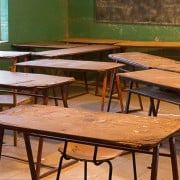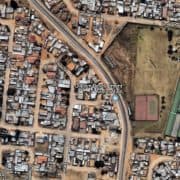|
Getting your Trinity Audio player ready...
|
By Lucky Menoe
First published on News24
It is early on a Saturday morning in late November 2017 as I arrive at Pendla Primary School in the Eastern Cape township of New Brighton to find that it is the latest victim in a series of school burglaries in the area. A computer and several packs of meat intended for the feeding scheme were stolen from the administration block of the school the night before.
My task for the day is to facilitate a capacity-building workshop for members of school governing bodies (SGBs) in the area. The group consists of teachers, parents and principals from various schools, brought together by Corruption Watch to share knowledge and information about strengthening SGBs in their respective schools.
As we go through the formalities of introductions and the attendance register, the banter in the room revolves around the robbery. The stolen computer contained recently captured electronic copies of learners’ academic results, scheduled for distribution to parents in the days following the break-in. Of more concern is that Pendla, a public entity built and maintained with taxpayers’ money, would most likely not be the last in the area to be robbed. New Brighton schools are under attack.
The school’s alarm system was triggered during the robbery, but the responding guard was unable to access the premises as the main gate was locked. Consensus in the room is that the alarm system is clearly not enough to deter thieves. If a private security system did little to eradicate the problem, then it was not only for the school to solve, but for the broader community.
Organised planning and involvement
Enter the organised community movement. Four months after the workshop, the disheartened mood has changed to one of action, thanks largely to the coordinating efforts of Mpumi Odolo, chair of the Nelson Mandela Bay arm of the National Association of School Governing Bodies.
Principals and SGB members from all the affected schools have taken it upon themselves to provide alternative security for the sake of their learners. Odolo, acting as facilitator of the process, has community members, local church leaders and the police involved in safeguarding schools in New Brighton and KwaZakhele.
The key message from the community to criminals is simple: their schools are off limits.
A volunteer has been deployed at BJ Mnyanda Primary School – one of those targeted towards the end of last year – to guard the premises on a nightly basis. This measure, although working, is not sustainable. It also has budgetary implications for the school: at some point, the need will arise for a paid service, and therefore good financial planning.
SGBs are the governance engines of any public school in South Africa. Their democratically elected members oversee the efficient running of the school – allowing the principal and faculty to focus on the education of learners. Over a three-year term, the SGB drives the best interests of the school, be they academic, economic or simply social, in as transparent and fair a manner as possible.
An SGB member has the power to uphold and effect the legislative underpinnings of a successful learning and teaching environment where everyone involved, grows. The guiding legislation is the South African Schools Act (SASA).
Where strong governance systems and strategic leadership is lacking, cracks appear and criminal elements infiltrate public institutions, as in the Pendla case. All measures needed to eliminate security threats were in place, hence the alarm system and locked gate.
But the criminals raised the bar by surpassing these and stealing from the school; the SGB members and the principal had no option but to engage stricter methods. In keeping with SASA requirements, Odolo’s movement has made a point of keeping a healthy relationship with the district office of the education department.
Corruption in schools
Corruption Watch’s schools campaign highlights the importance of SGBs as a component of the education system. We started off in 2013 by interrogating not only the relevance of the governing body as a structure, but the support it receives from its custodian in government, the national Department of Basic Education (DBE).
Where the SGB is installed in good faith, the results are proof: respectable academic performance, consistent parental involvement, and sound financial management. Reports sent to us over the years paint a worrying picture of the abuse of the SGB structure, sometimes by too-powerful principals who override policy, as well as members who siphon school resources for their own benefit.
The reports come from varying sources: teachers, parents, SGB members, learners and the general community. We have over 2 000 reports about corruption in public schools in our database, constituting a good 10% of the entire case load of Corruption Watch.
The overarching themes of school corruption cases include:
- Principals imposing their preferred service providers, such as security firms, on SGBs;
- Principals not sharing financial statements with SGBs, and therefore parents in general;
- SGB leadership being too close to the principal, allowing for the inappropriate use of school funds;
- SGB members side-lined in the vetting and appointment of school administrators, despite this being provided for in the SASA;
- School resources stolen by staff or SGB members for personal gain.
In Gauteng, the Matthew Goniwe School of Leadership and Governance has solidified SGB member training and empowerment. It has been a process marked by both successes and failures.
For some stakeholders, particularly SGB associations, the side-lining of exiting members is an error the department cannot afford to keep making. Its training mechanisms end up taking the form of tick box activities, while the new body misses out on the grooming and acclimatisation needed to settle in.
Ill-equipped SGBs are often unsure of how to manage their relationships with principals. They also have little knowledge on where or how to report suspicions of corruption or other irregularities. In some cases, where corrupt activities are reported to provincial departments, members are often victimised by perpetrators.
Engagements between Corruption Watch and SGB associations over the course of the campaign have revealed a lack of practical understanding of the interaction between SGBs and principals. There is often little understanding of SASA, thus principals are able to manipulate processes and procedures for personal gain.
Parents are also largely uninformed about the functions, roles and responsibilities in the management of schools. They too are unaware of how to compel governance structures to act transparently, and the means by which to hold those in office accountable.
Why do we need effective SGBs?
South Africa’s public schools are categorised into quintiles. Quintiles one and two refer to the province’s poorest and second poorest schools, as determined through a metric system. There are also quintile five schools, which represent the least poor. This classification also informs the comparable percentages of funds received by the schools.
The schools share the DBE budget, which in the early quintiles caters for learning materials, desks, healthy meals and scholar transport, among other needs. There are 12-million learners in more than 25 000 public schools across South Africa represented within the quintile system.
Corruption Watch’s SGB workshops empower members to ensure that school funds are spent on what the school needs. The next phase is that of creating informed awareness amongst parents and guardians on how to hold school leadership accountable.
The role of the DBE is imperative in the setting up of policies that aim for a changed environment, and Corruption Watch hopes to influence this process by ensuring that adequate policies are introduced and promoted to make transparency and accountability a norm and standard in the management of schools’ funds.
This will ensure that no learner at Pendla will go without a healthy meal. Working together with parents and the rest of the community, the SGB is equipped to canvass for infrastructure and services suited for their immediate environment and its dynamics.
On the shoulders of all parents or guardians of public school learners in the country, sits the obligation to partake in their schools’ SGB elections between 1 and 31 March 2018. Their task is to nominate and elect individuals of integrity who represent leadership and accountability in their duties.
Although no arrests have been made to date for the crimes committed against New Brighton’s learners, lawbreakers who set out to undermine their institutions of learning have a force to reckon with in the community movement organised by SGBs.
• Menoe is the deputy director of Corruption Watch. He is also the campaign lead for the organisation’s schools campaign.
• Image from Wikipedia (Creative Commons Attribution-Share Alike 3.0 Unported license)







